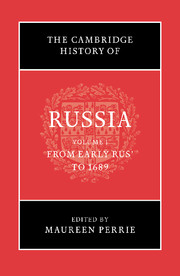Book contents
- Frontmatter
- 1 Introduction
- 2 Russia’s geographical environment
- Part I Early Rus’ and the Rise of Muscovy (c. 900–1462)
- 3 The origins of Rus’ (c.900–1015)
- 4 Kievan Rus’ (1015–1125)
- 5 The Rus’ principalities (1125–1246)
- 6 North-eastern Russia and the Golden Horde (1246–1359)
- 7 The emergence of Moscow (1359–1462)
- 8 Medieval Novgorod
- Part II The Expansion, Consolidation and Crisis of Muscovy (1462–1613)
- Part III Russia Under the First Romanovs (1613–1689)
- Bibliography
- Index
- Plate section"
- Plate section"
- References
8 - Medieval Novgorod
from Part I - Early Rus’ and the Rise of Muscovy (c. 900–1462)
Published online by Cambridge University Press: 28 March 2008
- Frontmatter
- 1 Introduction
- 2 Russia’s geographical environment
- Part I Early Rus’ and the Rise of Muscovy (c. 900–1462)
- 3 The origins of Rus’ (c.900–1015)
- 4 Kievan Rus’ (1015–1125)
- 5 The Rus’ principalities (1125–1246)
- 6 North-eastern Russia and the Golden Horde (1246–1359)
- 7 The emergence of Moscow (1359–1462)
- 8 Medieval Novgorod
- Part II The Expansion, Consolidation and Crisis of Muscovy (1462–1613)
- Part III Russia Under the First Romanovs (1613–1689)
- Bibliography
- Index
- Plate section"
- Plate section"
- References
Summary
It would be difficult to find a medieval Russian city with a more distinctive history than Novgorod.
For the last seventy years medieval Novgorod has been the subject of intensive archaeological investigation. The results of these excavations have provided significant compensation for the regrettable scarcity of conventional sources for the history of early Rus’. This scarcity was caused by environmental factors. Throughout the Middle Ages (and well into modern times, too) Russians lived in wooden houses, and the towns which constituted their cultural centres comprised a collection of wooden structures which regularly fell victim to fires.
It is a distinctive feature of the cultural layer of Novgorod that because of its high humidity and the consequent absence of aeration, all kinds of ancient items have been preserved, including those made from organic materials (wood, bone, leather, cloth and grain) which are usually irreversibly destroyed in normal circumstances. This peculiarity has enabled researchers to establish precise dates for all the objects which have been discovered in the excavations, by means of dendrochronology. It also permitted the great discovery in 1951 of documents written on birch bark, which were preserved in ideal conditions in the cultural strata. By the end of the fieldwork season in 2003, 949 birch-bark documents had been found in Novgorod itself, plus one in nearby Gorodishche, and a further 57 in the surrounding district (38 in Staraia Rusa and 19 in Torzhok). Of these, about 500 were found in strata dating from the eleventh century to the first third of the thirteenth century.
- Type
- Chapter
- Information
- The Cambridge History of Russia , pp. 188 - 210Publisher: Cambridge University PressPrint publication year: 2006
References
- 2
- Cited by

